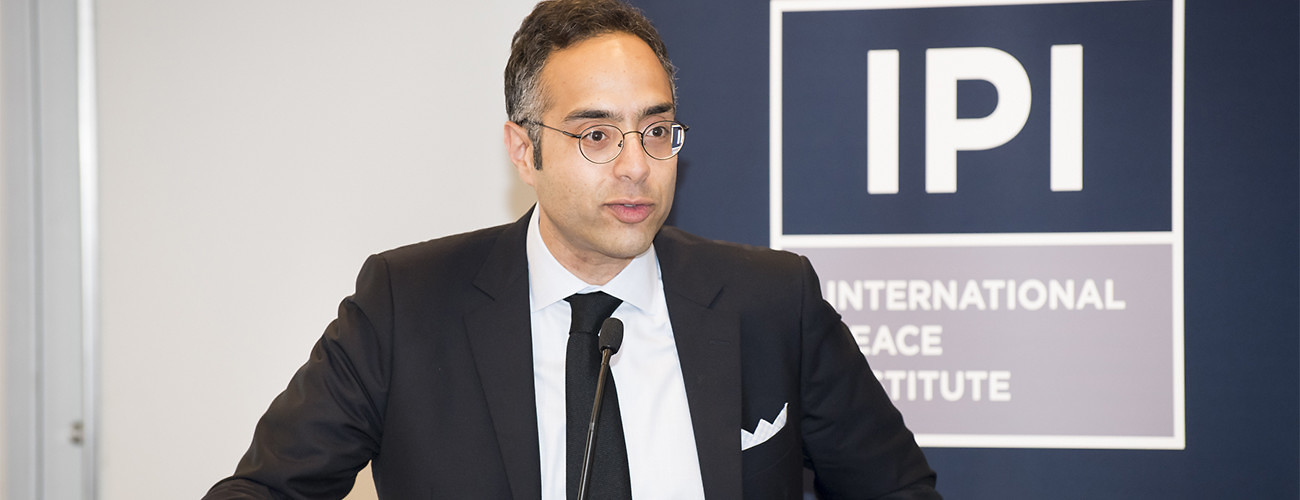The Arab Spring uprisings failed to meet people’s expectations for bringing democracy to the Middle East because most countries in the region inherited a long history of authoritarianism that inhibited any move toward representative government.
This was the central point of Tarek Masoud’s talk at a May 11th IPI Distinguished Author Series event during which he explained the reasoning behind the new book he co-authored with Jason Brownlee of the University of Texas at Austin and Andrew Reynolds of the University of North Carolina at Chapel Hill, The Arab Spring: Pathways of Repression and Reform.
The newly released book explains why some of the uprisings that shook the region beginning in 2011 managed to achieve regime change, while others didn’t. But it also goes deeper. Of the countries that overthrew their rulers—Egypt, Libya, Tunisia, and Yemen—only one, Tunisia, has actually turned into a full democracy.
Mr. Masoud, the Sultan of Oman associate professor of International Relations at Harvard University’s John F. Kennedy School of Government, said the main reason why Tunisia succeeded is that the small country inherited a tradition of pluralism and internal balance of power that was missing from the state apparatus of countries such as Egypt and Libya.
“We could have predicted how the Arab Spring would end even before it began,” Mr. Masoud declared. “The future of the Arab world is going to look a lot like its authoritarian past—except worse,” he added, noting that “at least during the authoritarian past you had some modicum of state authority that protected people from the kind of Hobbesian war of all against all. Today, we don’t even have that.”
Tunisia, he said, is the Arab World’s only liberal democracy and the only success story of the Arab Spring. “The central obsession of this book is to explain why,” he added.
Mr. Masoud acknowledged that many have tried to tackle this question. But they have focused on the wrong answers, he said, such as the role played by the countries’ militaries, the impact of new communication technologies, or the different grievances that existed in those states. While these factors may address part of the question, Mr. Masoud said, they don’t actually answer it.
On grievances, for example, the Harvard professor said that in most cases these had been there for a long time, and so saying they provoked the 2011 uprisings doesn’t really answer the question of why then.
The same goes for the role played by the military, Mr. Masoud said. Revolutions succeed, the argument goes, only when a professional military decides to defect from the ruling regime. “But of course,” he said, “if you know anything about the militaries in those countries, it’s not at all the case.” Yemen, he said, did not have a professional military, but Yemenis still removed Ali Abdullah Saleh from power. And Tunisia, he continued, transitioned to democracy without the involvement of its military.
“Explaining why Tunisia didn’t have a military coup requires us to do more than just look at the army, because all the conditions for a military coup were actually there,” he said.
The answer, Mr. Masoud said, has to do with the kind of state Tunisians and Egyptians inherited, which in turn explains why their first post-revolution elections went in different directions.
“The difference really rests in understanding what happened among the politicians themselves,” he said. “In Tunisia, the politicians were actually able to come to some kind of an agreement, and therefore avoided the mass protests of the magnitude that we saw in Egypt.”
That agreement was the result of a relatively balanced first election in which the Islamist al-Nahda won 40 percent of the votes. In Egypt, however, Islamist parties gained a total of 70 percent of seats in the parliament. “There was a huge imbalance in the political landscape,” Mr. Masoud said, which “is the proximate explanation for why Tunisia goes one way and Egypt goes the other.”
This imbalance ultimately led to Egypt’s 2013 military coup, Mr. Masoud said, reflecting a political science truth that, in states where power is evenly shared, “the government does not feel that it can be arbitrary, and the opposition should not be revolutionary and irreconcilable.”
“I think this even balance of power existed in Tunisia,” Mr. Masoud said. “The liberal opposition saw that they got a majority of the vote in 2011, so they had no need to be revolutionary and irreconcilable.”
“The liberals in contrast in Egypt did not want another election…. They didn’t want that because they knew that compared to the Muslim Brotherhood and the Salafists—both of whom had large ground operations—they would have a hard time mounting political campaigns, even finding candidates to run.”
When it comes to Libya, Mr. Masoud said the importance of inherited state traditions is even more evident. Muammar Qaddafi’s 40-year rule, Mr. Masoud said, was based on a philosophy of state dismantlement, carried out with the goal of eliminating any challenger to his rule.
“The problem,” Mr. Masoud said, “is that when you then overthrow Qaddafi, you as an ascendant democrat, have very little in the way of a state to actually govern the territory.”
The event was moderated by IPI Senior Adviser for External Relations Warren Hoge.
Watch event:








